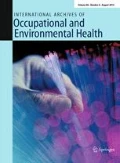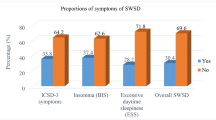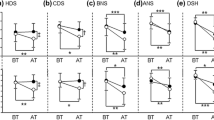Abstract
Purpose
To investigate the effects of shift work schedules on sleep quality and mental health in female nurses in south Taiwan.
Methods
This study recruited 1,360 female registered nurses in the Kaohsiung area for the first survey, and among them, 769 nurses had a rotation shift schedule. Among the 769 rotation shift work nurses, 407 completed another second survey 6–10 months later. Data collection included demographic variables, work status, shift work schedule, sleep quality (Pittsburgh Sleep Quality Index), and mental health (Chinese Health Questionnaire-12).
Results
Nurses on rotation shift had the poor sleep quality and mental health compared to nurses on day shift. The nurses on rotation shift had a relatively higher OR of reporting poor sleep quality and poor mental health (OR, 2.26; 95% CI, 1.57–3.28; and OR, 1.91; 95% CI, 1.39–2.63, respectively). Additionally, rotation shift nurses who had ≥2 days off after their most recent night shifts showed significantly improved sleep quality and mental health (PSQI decreased of 1.23 and CHQ-12 decreased of 0.86, respectively). Comparison of sleep quality between the first and second surveys showed aggravated sleep quality only in nurses who had an increased frequency of night shifts.
Conclusion
Female nurses who have a rotation shift work schedule tend to experience poor sleep quality and mental health, but their sleep quality and mental health improve if they have ≥2 days off after their most recent night shifts. This empirical information is useful for optimizing work schedules for nurses.
Similar content being viewed by others
References
Akerstedt T, Ingre M, Broman JE, Kecklund G (2008) Disturbed sleep in shift workers, day workers, and insomniacs. Chronobiol Int 25(2):333–348. doi:10.1080/07420520802113922
Arimura M, Imai M, Okawa M, Fujimura T, Yamada N (2010) Sleep, mental health status, and medical errors among hospital nurses in Japan. Ind Health 48(6):811–817. doi:JST.JSTAGE/indhealth/MS1093
Bara AC, Arber S (2009) Working shifts and mental health–findings from the British Household Panel Survey (1995–2005). Scand J Work Environ Health 35(5):361–367
Berger AM, Hobbs BB (2006) Impact of shift work on the health and safety of nurses and patients. Clin J Oncol Nurs 10(4):465–471
Buysse DJ, Reynolds CF 3rd, Monk TH, Berman SR, Kupfer DJ (1989) The Pittsburgh Sleep Quality Index: a new instrument for psychiatric practice and research. Psychiatry Res 28(2):193–213. doi:0165-1781(89)90047-4
Cheng TA, Williams P (1986) The design and development of a screening questionnaire (CHQ) for use in community studies of mental disorders in Taiwan. Psychol Med 16(2):415–422
Chong MY, Wilkinson G (1989) Validation of 30- and 12-item versions of the Chinese Health Questionnaire (CHQ) in patients admitted for general health screening. Psychol Med 19(2):495–505
Conway PM, Campanini P, Sartori S, Dotti R, Costa G (2008) Main and interactive effects of shiftwork, age and work stress on health in an Italian sample of healthcare workers. Appl Ergon 39(5):630–639. doi:10.1016/j.apergo.2008.01.007
Costa G (2003) Shift work and occupational medicine: an overview. Occup Med (Lond) 53(2):83–88
Drake CL, Roehrs T, Richardson G, Walsh JK, Roth T (2004) Shift work sleep disorder: prevalence and consequences beyond that of symptomatic day workers. Sleep 27(8):1453–1462
Fujimoto T, Kotani S, Suzuki R (2008) Work-family conflict of nurses in Japan. J Clin Nurs 17(24):3286–3295. doi:10.1111/j.1365-2702.2008.02643.x
Gold DR, Rogacz S, Bock N, Tosteson TD, Baum TM, Speizer FE, Czeisler CA (1992) Rotating shift work, sleep, and accidents related to sleepiness in hospital nurses. Am J Public Health 82(7):1011–1014
Knauth P, Hornberger S (2003) Preventive and compensatory measures for shift workers. Occup Med (Lond) 53(2):109–116
Lamond N, Dorrian J, Roach GD, McCulloch K, Holmes AL, Burgess HJ, Fletcher A, Dawson D (2003) The impact of a week of simulated night work on sleep, circadian phase, and performance. Occup Environ Med 60(11):e13
Pandi-Perumal SR, Trakht I, Srinivasan V, Spence DW, Maestroni GJ, Zisapel N, Cardinali DP (2008) Physiological effects of melatonin: role of melatonin receptors and signal transduction pathways. Prog Neurobiol 85(3):335–353. doi:10.1016/j.pneurobio.2008.04.001
Rosa RR, Colligan MJ (1997) Plain language about shiftwork
Ruggiero JS (2005) Health, work variables, and job satisfaction among nurses. J Nurs Adm 35(5):254–263. doi:00005110-200505000-00009
Schernhammer ES, Rosner B, Willett WC, Laden F, Colditz GA, Hankinson SE (2004) Epidemiology of urinary melatonin in women and its relation to other hormones and night work. Cancer Epidemiol Biomarkers Prev 13(6):936–943
Srinivasan V, Pandi-Perumal SR, Trakht I, Spence DW, Hardeland R, Poeggeler B, Cardinali DP (2009) Pathophysiology of depression: role of sleep and the melatonergic system. Psychiatry Res 165(3):201–214. doi:10.1016/j.psychres.2007.11.020
Suzuki K, Ohida T, Kaneita Y, Yokoyama E, Miyake T, Harano S, Yagi Y, Ibuka E, Kaneko A, Tsutsui T, Uchiyama M (2004) Mental health status, shift work, and occupational accidents among hospital nurses in Japan. J Occup Health 46(6):448–454. doi:JST.JSTAGE/joh/46.448
Tsai PS, Wang SY, Wang MY, Su CT, Yang TT, Huang CJ, Fang SC (2005) Psychometric evaluation of the Chinese version of the Pittsburgh Sleep Quality Index (CPSQI) in primary insomnia and control subjects. Qual Life Res 14(8):1943–1952. doi:10.1007/s11136-005-4346-x
van Mark A, Weiler SW, Schroder M, Otto A, Jauch-Chara K, Groneberg DA, Spallek M, Kessel R, Kalsdorf B (2010) The impact of shift work induced chronic circadian disruption on IL-6 and TNF-alpha immune responses. J Occup Med Toxicol 5:18. doi:10.1186/1745-6673-5-18
Wilson JL (2002) The impact of shift patterns on healthcare professionals. J Nurs Manag 10(4):211–219. doi:10.1046/j.1365-2834.2002.00308.x.
Acknowledgments
The authors express their thanks to Kaohsiung County Nurses Association and Kaohsiung City Nurses Association. The project was supported by the Institute of Occupational Safety and Health (No: ISOH95-M318, IOSH96-M318) and the National Science Council (No: NSC97-2314-B-037-018-MY3).
Conflict of interest
The authors declare that they have no conflict of interest.
Author information
Authors and Affiliations
Corresponding authors
Rights and permissions
About this article
Cite this article
Lin, PC., Chen, CH., Pan, SM. et al. Atypical work schedules are associated with poor sleep quality and mental health in Taiwan female nurses. Int Arch Occup Environ Health 85, 877–884 (2012). https://doi.org/10.1007/s00420-011-0730-8
Received:
Accepted:
Published:
Issue Date:
DOI: https://doi.org/10.1007/s00420-011-0730-8




